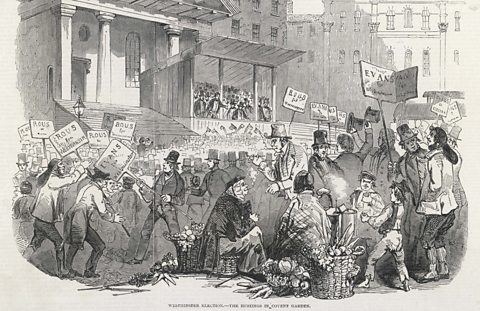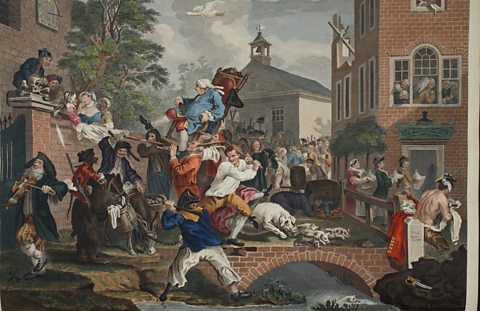Fairness and equality of elections

Before 1872, the use of hustings (public meetings where candidates for election met members of the constituents) and open voting was commonplace.
This meant that voters could be offered bribes or be subject to intimidation in order to vote a certain way.
The system still did not give equal representation to the various parts of the United Kingdom. Areas such as Scotland still found themselves with fewer MPs and less of a say in Parliament than many other smaller areas of the UK.
Secret Ballot Act, 1872
In 1872 the government introduced the Ballot Act. This attempted to deal with the problem of electoral malpractice by allowing secret ballots:
- hustings were replaced with voting in polling booths
- this reduced corruption in voting - so no-one could be sure of how another person would vote
- voters had complete privacy - potential bribery or blackmail was severely curtailed
The impact of the Act would have been most prominent in areas where there were a lot of voters. This Act ensured that voting came to be seen primarily as a political act rather than a social occasion
Corrupt and Illegal Practices Act 1883

The Ballot Act failed to remove bribery from the voting process.
After the 1880 election, the government established a Royal Commission to investigate electoral practices. Its findings led the government to pass the Corrupt and Illegal Practices Act of 1883:
- the Act limited the amount of money that a candidate could spend on election campaigns
- bribery, such as buying food and drink for potential supporters, was banned.
- all candidates had to justify every expense during the campaign.
Allegations of illegality during elections did decline significantly after this Act was passed, as did the election expenditure of candidates.
Redistribution of seats - 1867, 1885 and 1918
During the 1800s and early 1900s, the demographics of Britain changed greatly due to the Agricultural and Industrial Revolutions.
Many rural areas became depopulated, while newly developed towns continued to grow.
While there were fewer people living in rural districts, they still remained as politically influential as towns like Manchester and Liverpool, where the population had increased greatly.
The redistribution of political seats attempted to spread MPs more fairly amongst the population. This was often done by reducing the number of seats in rural areas and creating additional seats in places where the population had increased.
Although some redistribution did occur in 1867, it was piecemeal.
The redistribution of seats in 1885 was more significant. It gave growing towns the right to send more MPs to Parliament and a redistribution of 142 seats took place.
This cut the old dominance of southern England and increased Scottish representation to 72.
More guides on this topic
- Why Britain became more democratic, 1851ŌĆō1928
- Why women won greater political equality by 1928
- Why the Liberals introduced social welfare reforms
- The effectiveness of the Liberal social welfare reforms
- Effectiveness of the Labour social welfare reforms, 1945ŌĆō51
- Working conditions in Scottish industry in the 1940s